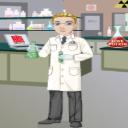Yahoo Answers is shutting down on 4 May 2021 (Eastern Time) and the Yahoo Answers website is now in read-only mode. There will be no changes to other Yahoo properties or services, or your Yahoo account. You can find more information about the Yahoo Answers shutdown and how to download your data on this help page.
When Did Science Become a Democracy?
If I mix sodium (Na) with calcium (Ca) then I get table salt. I get table salt (Na Cl) because that is the chemical reaction that occurs when these to elements are mixed together.
Now I hear that x percent of scientists believe this or y percent believe that. Form global warming to what makes a planet a planet it all seems subject to a vote.
Science does not work that way does it? Science is not a democracy. When did scientists vote on the Law of Gravity? When they vote and decide Earth is not the center of the universe or evil spirits do not cause infectious diseases?
13 Answers
- andymanecLv 75 years ago
Sort of. Science is extremely democratic, but not in the way that you're probably thinking. It's not like it's just up for a vote, and the winner is accepted. It's more like arguments and evidence and debate until effectively the entire scientific community is convinced. This argument goes both ways, though - when one idea wins out and is accepted as the scientific consensus, it has probably changes significantly from when it was originally proposed. When someone argues from a position of complete inflexibility, it's usually a sign that they're a crank.
In other words, science isn't a democracy in that everyone gets to vote on the truth. It's a democracy in that everyone has a voice (provided that that voice is backed up by evidence) in working together to figure out an accurate explanation of the evidence.
I also want to point out that you're kind of comparing apples and oranges with sodium chloride and climate change. When you hear about scientific disagreement, it's usually around topics that are fairly recent. The periodic table has been around for about 150 years, and basic chemistry for longer than that. The fine details of climate change are still being hammered out - and still, something like 99% of climate scientists agree with it, though in the past decade or so, there was still a lot of debate going on. If you went back in time by about a century and a half, you'd probably see the same sort of thing with sodium chloride. Or with gravity. Or with any scientific idea in its formative years.
It's just that the explanation has been validated by so much additional science that it looks like an obvious, irrefutable truth to us now. They weren't just obvious truths in their infancy - they are the result of vigorous debate, collaboration, and relentless testing.
- The Black HoleLv 65 years ago
There has always been disagreement and debate in science from the start, that is what makes it science. Until definative experiments and evidence proves otherwise, an idea will always be open for discussion. What science is not is an authoritative dictatorship, despite what Al Gore happens to think.
- Anonymous5 years ago
Democracy (Greek: δημοκρατία, Dēmokratia literally "rule of the commoners"), in modern usage, is a system of government in which the citizens elect representatives from among themselves to form a governing body, such as a parliament. It is sometimes referred to as "rule of the majority"."
Science is a systematic enterprise that builds and organizes knowledge in the form of testable explanations and predictions about the universe.
Science never was a democracy and it never will be. regardless of our differences, the people we elect people to office should at least understand and respect the scientific method.
- HonestLv 75 years ago
I got there listening to Randy Newman on YouTube
talking about his POLITICAL SCIENCE. It sounds
like what Mr. Donald Trump would parrot to win the
2016 GOP White House. Let's keep it simple for
Republicans.
- 5 years ago
So, salt is mixture of Na and Ca is it?
Tell me when you carry out some experiments on salt water - I don't want to be anywhere near!
- RaymondLv 75 years ago
Sodium (Na) and CHLORINE (Cl).
Deciding what a thing is called CAN be decided by the majority. And even then, it can change over time and over cultures. (Earth's satellite has many official names: Moon, Lune, Luna, 月, Mouna...).
When a population uses a name for an object, it is because (in most cases) a majority of people have agreed over time to use that word to represent that object. It is a kind of implicit vote.
Just go around and decide to use the phrase "Seventh month" (a direct translation of "September") to replace the name of what is, for us, the 9th month, and see how far you get. You will get "voted down" by the general population.
ALL language is the result of a form of democracy. Why should scientific language be different?
-----
The word "planet" comes from the Greek "aster planetes"
aster was the general name for any object "in the heavens" for the Greek philosophers.
As opposed to "meteors" (= object in the high atmosphere) for example.
Some of the "aster" moved in a somewhat predictable way. They were "wandering stars" = aster planetes.
Others were moving upredictably. And they had an odd shape, as it they had a head of hair. They were called aster cometes (stars with hair) by the Greek astronomers. We call them "comets" but there are other cultures that call them "broom stars" (and they outnumber us).
The Sun was a planet.
It is an aster (an object in the heavens) and it moves in a predictable way relative to the fixed stars (planetes).
In the early 1600s, when Galileo found moving stars following Jupiter, he called them "planets". They fit the definition... at that time.
In the late 1600s, after Newton published Principiae..., it was clear that the Sun was an object different from the other wandering stars. It was the centre of the universe (or, at least, of our system).
The major "planets" were in orbit around the Sun and so they remained "planets" (no need to change their category).
The things in orbit around a planet were called "satellites" (from an old Latin word meaning companion or follower). Thus Jupiter's planets became Jupiter's satellites.
The other planet called "Moon" was downgraded to satellite (and it kept its proper name of "Moon" in English).
The biggest demotion was Earth, dropping from centre of the universe to mere planet.
This happened because a majority of astronomers, at the time, agreed to use those words in that fashion. It was a kind of implicit vote. Just as there have been other words that had been proposed to the community of astronomers and they ended up rejecting the offer (or, if you prefer, it did not "catch on"). They were "voted down" even though there was not a formal vote called on a precise date, on that particular topic.
Agreeing on these words is important when trying to describe stuff.
For example, if you are trying to write a theory to explain the formation of "planets", it is relatively easy to do so... as long as you are not forced to cover Pluto (it was formed differently and later than the "real" planets).
Therefore, it is important to ensure that when a word is used, people do understand what is behind that word. And sometimes, it is important to have a discussion (which could lead to a vote) on deciding what is what.
- JimZLv 75 years ago
Calcium and sodium are both cations and won't form salts. Salts are ionic compounds formed from related numbers of cations and anions. Cl is the anion in common table salt. You are right that science isn't about consensus. It is trying to determine was is most likely true based on the available evidence. Those who think all the evidence is available are delusional or don't know much.
- ?Lv 75 years ago
Since U.S.A. is a democratic Country All fields are automatically in our democracy. Mike
Source(s): Logic






